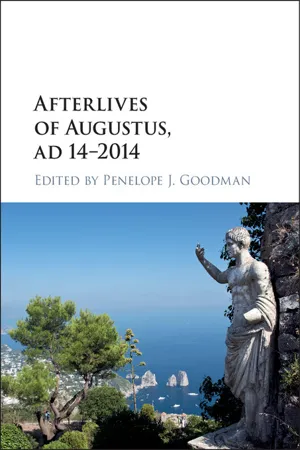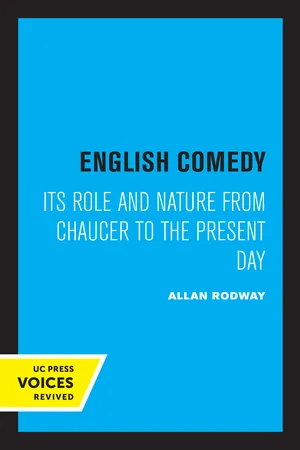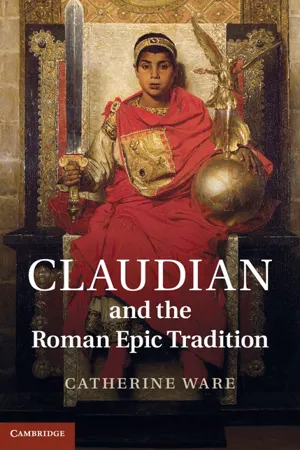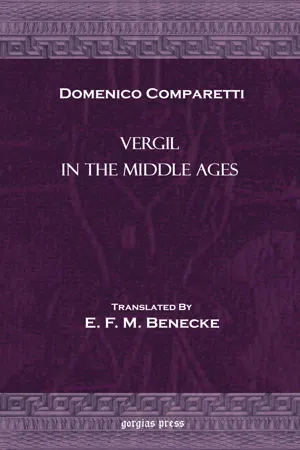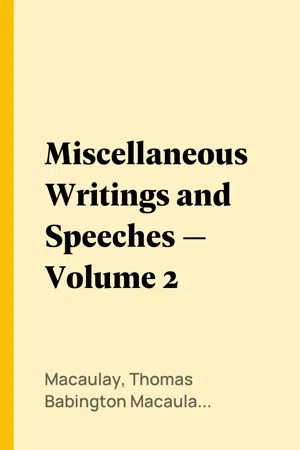Literature
The Augustan Age
The Augustan Age refers to the period in English literature during the reign of Queen Anne and the first two Georges, from 1700 to 1750. It is characterized by a focus on reason, order, and satire, and is known for the works of writers such as Alexander Pope, Jonathan Swift, and Joseph Addison. The literature of this time often reflected the political and social climate of the era.
Written by Perlego with AI-assistance
Related key terms
1 of 5
7 Key excerpts on "The Augustan Age"
- eBook - PDF
- Peter Widdowson(Author)
- 2017(Publication Date)
- Red Globe Press(Publisher)
A rather more limited conception of it is signalled by Oliver Goldsmith’s ‘Account of The Augustan Age in England’ (1759) which sees the term as applying to the literature of Queen Anne’s reign (1702–14), 62 T HE P ALGRAVE G UIDE TO E NGLISH L ITERATURE AND ITS C ONTEXTS , 1500–2000 a view sustained by Matthew Arnold in 1861, who refers to ‘the Augustan [Age] of Queen Anne’. Further complications can be discerned in Horace Walpole’s reference in 1772 to ‘this our Augustan Age’; and when the term ‘Augustanism’ is first used (pejoratively) in 1903–4, we find the following period limits laid out: ‘The period of Augustanism in English Literature – that age of acceptance which began after Milton and ended with Gray and Collins’ (i.e. by the 1760s/1770s). But we should also accept, in our ongoing contest with periodisation, that Augustan principles underlie the work of Dr Johnson, that Jane Austen (1775–1817) is sometimes considered to be a ‘late Augustan’, and that, as noted in timeline ‘narrative’ Literature above, the transition from Neo-Classical* literature to that which promotes ‘Sensibility’ and evinces proto-Romantic* tendencies is apparent relatively early in the 18th Century. Despite the above variations, the terms ‘Augustan’ and ‘Augustanism’ (in non-pejorative usage, those features of form, content and stance which are commonly found in the arts so defined) may be understood to include literary work from the later decades of the 17th Century through to the mid-18th Century, but exemplified most typically by the writings of such ‘Augustans’ as Dryden, Pope, Addison, Steele, Gay and Swift. The aesthetic characteristics of Augustan literature are outlined in the following gloss on the adjective Neo-Classical*. - eBook - PDF
- Penelope J. Goodman(Author)
- 2018(Publication Date)
- Cambridge University Press(Publisher)
Petrarch, for example, urged Francesco da Carrara, ruler of Padua, to emulate Augustus’ promotion of ‘learned and distinguished men’, 51 strengthening his case by praising Augustus himself fulsomely throughout the same letter. This world is explored by Black (Chapter 11), who reveals that the fifteenth-century writers Guarino Veronese and Pier Candido Decembrio regarded the literary output of The Augustan Age as direct 48 Al-Mas’ūdī, murūj al-dhahab (Meadows of Gold) 27; translation in Jones 2006: 271–4. 49 In this he reflects an established Egyptian tradition of viewing her as a heroine: Jones 2006: 270–1. 50 Recent publications include Harrison 2007, chapters 20–4; Farrell and Putnam 2010; Wilson- Okamura 2010; Miller and Newlands 2014. 51 Petrarch, Rerum senilium libri 14.1.50. Best of Emperors or Subtle Tyrant? Augustus the Ambivalent 11 evidence for his own qualities as a ruler. Augustus’ (indirect) ancient role as a patron of the arts, then, ensured continuing admiration in a new age of patronage, while also colouring political attitudes towards him. Indeed, across Europe, it fostered a self-reinforcing cycle. Panegyrical writers compared political figures like Cosimo de’ Medici, Henry VIII, Oliver Cromwell and Charles II of England to Augustus. 52 They, too, encouraged the association, as seen for example in Pope Sixtus IV’s building projects in Rome, Louis XIV’s extensive association with Apollo, and Charles II’s coronation parade, which passed through a series of lavish triumphal arches evoking Augustan themes. 53 Xinyue (Chapter 12) explores in detail the case of seventeenth-century Dijon, where the poet Morisot’s desire to emulate both Ovid and Vergil came together with the contemporary monarchy’s use of Augustan victory motifs and the notion of the cosmocrator to enhance the profiles of both, and in the process reaffirm Augustus’ own status as the ideal ruler. Yet critical voices emerged during this same period, as Black also shows. - eBook - PDF
English Comedy
Its Role and Nature from Chaucer to the Present Day
- Allan Rodway(Author)
- 2023(Publication Date)
- University of California Press(Publisher)
The earliest Augustan comic writers would have bitterly agreed, and they did their best, from their experience of chaos in the outer world, to make it otherwise. For Sterne, writing in an exterior world made safer and more 'symmetrical', in part by their efforts, it was man's inner world, or at most his interpersonal world, that mattered. So, following Fielding, he finally turned Augustan comedy inside out by being celebratory, releasing, and innovating on the subject of human unreason—a kind of unreason, however, itself expressive of an Age of Reason, and therefore not unreasonably appreciated by the more civilised and sensitive members of its closing years: the unreason of the stream of consciousness, of the association of ideas. 8 Regency c. 1800-1830 A. General B. Jane Austen, Peacock; Byron, Shelley A. GENERAL No period seems to demonstrate more clearly than this the under- lying function of comedy as a mode of psychological warfare. Between 1760 or so and the period of the Napoleonic Wars an Age of Com- promise passed into an Age of Extremism—with a sudden change into top gear at the time of the French Revolution. And sure enough in the 'Regency' period the major comic writers, Jane Austen and Peacock on the one hand, Byron and the supposedly humourless Shelley on the other, are found to represent in mutual mockery the opposition of neo-Augustanism and Romanticism—an opposition closely connected with an underlying ideological conflict more bitter than anything since the Civil War. The transition period, between Augustan and Regency ages, lacks major comic writers, and the minor comedy of Goldsmith and Sheridan is compromised by its Age and uncommitted to any ideological camp (Burns, combating elements in the very different climate of Scotland, is the exception that proves the rule). The temper of comedy in fact, matches that of Society. - eBook - PDF
- Catherine Ware(Author)
- 2012(Publication Date)
- Cambridge University Press(Publisher)
In the Augustan period, the golden age was presented as being almost at hand and Rome appeared to be on the threshold of a new aureum saeculum, one which was dependent on the emperor. 28 The concept became central to Augustan ideology. 29 In the Carmen saeculare, written for the inauguration of the new saeculum in 19 bc, Horace builds on Virgilian auctoritas, addressing Augustus in terms which suggest that the prophecy of Anchises has been fulfilled. 30 While Horace does not promise a full golden age, the prayers for fertility and prosperity (29–32) and the return of virtues imply that this better age will have golden-age associations. 31 Like Virgil, he acknowledges that wars will be necessary but his suggested wars with the Medes and Scythians are more realistic than Virgil’s references to the Argo and Troy. After Augustus the golden age remained a topos of imperial propaganda, purged of all ambiguities. Successive emperors proclaimed reparatio saeculi and it became a commonplace of coinage and panegyric, to be used on any occasion. 32 Statius compares the public feast of Domitian to the aureum tempus, the comparison suggested by the lavish provisions of food and wine (Silu. 1.6.39–42). The celebration of Rome’s millennium inspired the slogan aurea aetas and its variants on coins. 33 The theme occurs frequently in the Panegyrici Latini. The fertility of Britain, its freedom from snakes and savage animals, make the birthplace of Constantine a locus amoenus, a setting for the golden age (Pan. Lat. vi(7)9.2). Mamertinus claims that men are more fortunate under Julian than the inhabitants of the Isles of the Blest (Pan. Lat. iii(11)23.1). In the fourth century Symmachus praised the reign of the Christian emperor Gratian (Orationes 3.9) in golden-age terminology. - eBook - PDF
- D. Comparetti(Author)
- 2002(Publication Date)
- Gorgias Press(Publisher)
VERGIL IN THE MIDDLE AGES P A B T I THE VERGIL OF LITERARY TRADITION Tityrus et fruges Aeneiaque arma legentur Roma triumphati dum caput orbis erit. OVID, Am., I . 1 5 . 2 5 . 0 anima cortese mantovana Di cui la fama ancor nel mondo dura E durerà quanto '1 mondo lontana. DANTE, In}., 2 . 2 8 . INTRODUCTION VERGIL is the chief representative of those poets whom their contemporaries called the ' new poets'; and new poets they were, living in times that were new. The Augustan Age was an epoch in which novelty was a general fact and a general need of the Roman world. The Roman people, that had striven through so many years of self-denial to attain such greatness, was anxious now to enjoy the greatness to which it had attained, to live in a way becoming to that greatness, to expand in a thousand directions, to embellish and refine its life, intellectual no less than material. The old life of the Republic seemed crude and mean to this newer generation; it was a thing to be admired from a distance, no doubt, but its realization was no longer impossible, for it was no longer in proportion to their ways of life and thought. And however severely this great renewal, this breaking away from the stern B 2 VERGIL IN THE MIDDLE AGES traditions o£ antiquity, may be judged from a political stand-point or in the light of after events, there can be no doubt that it was the new condition of things which gave birth in the regions of science and art to those tendencies and those aims to which are due the most lofty productions of Roman literature and thought. It is not our object here to study the growth of this new school of poets, to discuss the causes of their greatness and suc-cess, or to describe the opposition which they encountered at the hands of those champions of conservatism who are invari-ably to be found in all periods of progress. - eBook - PDF
- Carole E. Newlands(Author)
- 2015(Publication Date)
- I.B. Tauris(Publisher)
23 II Writing for an Age of Gold: The Love Elegist • • Let Antiquity please others; as for me, I’m glad to have been born now: this age suits my temperament. ( Ars Amatoria 3.121–2) Ovid was a great comic poet in an era when comedy could be deemed politically incorrect. From the start of his literary career Ovid presents himself as a poet both very much of The Augustan Age and on a nonconformist track in dialogue with, as Alison Sharrock puts it, ‘the most powerful contemporary signifiers of the masculine order: Augustus, arma (war and epic), and political life’. 1 In Ovid’s poetry we are frequently conscious of a parallel political discourse as the boundaries between the discourses of love and of politics become provocatively blurred. War, the driving force of Roman imperial power, becomes in Ovid’s poetry not only a metaphor for love but also a similar practice for, as Ovid most blatantly 24 Ovid put it in Am . 1.9.1, ‘every lover is a soldier.’ Love, moreover, in Rome was a political matter, subject to severe legislation. 2 Let us therefore take a look at the emperor who tired of Ovid’s wit and in 8 CE banished him from the city that was the centre of his world. Augustus Augustus ruled between 31 BCE and 14 CE as Rome’s first emperor. He rode to power on winds of change, for Rome was exhausted after two decades of civil war and was desperate for a leader who could bring political stability. Victorious over Mark Antony and Cleopatra at the Battle of Actium in 31 BCE, Augustus set about establishing a new form of governance for Rome and a lasting peace. 3 Although the idea of monarchy was anathema to the Romans, who had expelled their last king on the traditional date of 510 BCE when they established a republic, they now had to accept one-man rule. - eBook - ePub
- Macaulay, Thomas Babington Macaulay, Baron(Authors)
- 2008(Publication Date)
- Perlego(Publisher)
The history of every literature with which we are acquainted confirms, we think, the principles which we have laid down. In Greece we see the imaginative school of poetry gradually fading into the critical. Aeschylus and Pindar were succeeded by Sophocles, Sophocles by Euripides, Euripides by the Alexandrian versifiers. Of these last, Theocritus alone has left compositions which deserve to be read. The splendour and grotesque fairyland of the Old Comedy, rich with such gorgeous hues, peopled with such fantastic shapes, and vocal alternately with the sweetest peals of music and the loudest bursts of elvish laughter, disappeared forever. The master-pieces of the New Comedy are known to us by Latin translations of extraordinary merit. From these translations, and from the expressions of the ancient critics, it is clear that the original compositions were distinguished by grace and sweetness, that they sparkled with wit, and abounded with pleasing sentiment; but that the creative power was gone. Julius Caesar called Terence a half Menander,—a sure proof that Menander was not a quarter Aristophanes.The literature of the Romans was merely a continuation of the literature of the Greeks. The pupils started from the point at which their masters had, in the course of many generations arrived. They thus almost wholly missed the period of original invention. The only Latin poets whose writings exhibit much vigour of imagination are Lucretius and Catullus. The Augustan Age produced nothing equal to their finer passages.In France that licensed jester, whose jingling cap and motley coat concealed more genius than ever mustered in the saloon of Ninon or of Madame Geoffrin, was succeeded by writers as decorous and as tiresome as gentlemen ushers.The poetry of Italy and of Spain has undergone the same change. But nowhere has the revolution been more complete and violent than in England. The same person who, when a boy, had clapped his thrilling hands at the first representation of the Tempest might, without attaining to a marvellous longevity, have lived to read the earlier works of Prior and Addison. The change, we believe, must, sooner or later, have taken place. But its progress was accelerated, and its character modified, by the political occurrences of the times, and particularly by two events, the closing of the theatres under the Commonwealth, and the restoration of the House of Stuart.We have said that the critical and poetical faculties are not only distinct, but almost incompatible. The state of our literature during the reigns of Elizabeth and James the First is a strong confirmation of this remark. The greatest works of imagination that the world has ever seen were produced at that period. The national taste, in the meantime, was to the last degree detestable. Alliterations, puns, antithetical forms of expression lavishly employed where no corresponding opposition existed between the thoughts expressed, strained allegories, pedantic allusions, everything, in short, quaint and affected, in matter and manner, made up what was then considered as fine writing. The eloquence of the bar, the pulpit, and the council-board, was deformed by conceits which would have disgraced the rhyming shepherds of an Italian academy. The king quibbled on the throne. We might, indeed, console ourselves by reflecting that his majesty was a fool. But the chancellor quibbled in concert from the wool-sack: and the chancellor was Francis Bacon. It is needless to mention Sidney and the whole tribe of Euphuists; for Shakspeare himself, the greatest poet that ever lived, falls into the same fault whenever he means to be particularly fine. While he abandons himself to the impulse of his imagination, his compositions are not only the sweetest and the most sublime, but also the most faultless, that the world has ever seen. But, as soon as his critical powers come into play, he sinks to the level of Cowley; or rather he does ill what Cowley did well. All that is bad in his works is bad elaborately, and of malice aforethought. The only thing wanting to make them perfect was, that he should never have troubled himself with thinking whether they were good or not. Like the angels in Milton, he sinks "with compulsion and laborious flight." His natural tendency is upwards. That he may soar, it is only necessary that he should not struggle to fall. He resembles an American Cacique, who, possessing in unmeasured abundance the metals which in polished societies are esteemed the most precious, was utterly unconscious of their value, and gave up treasures more valuable than the imperial crowns of other countries, to secure some gaudy and far-fetched but worthless bauble, a plated button, or a necklace of coloured glass.
Index pages curate the most relevant extracts from our library of academic textbooks. They’ve been created using an in-house natural language model (NLM), each adding context and meaning to key research topics.

